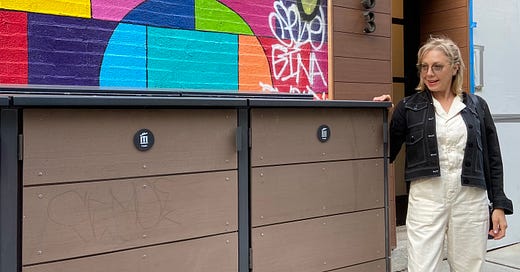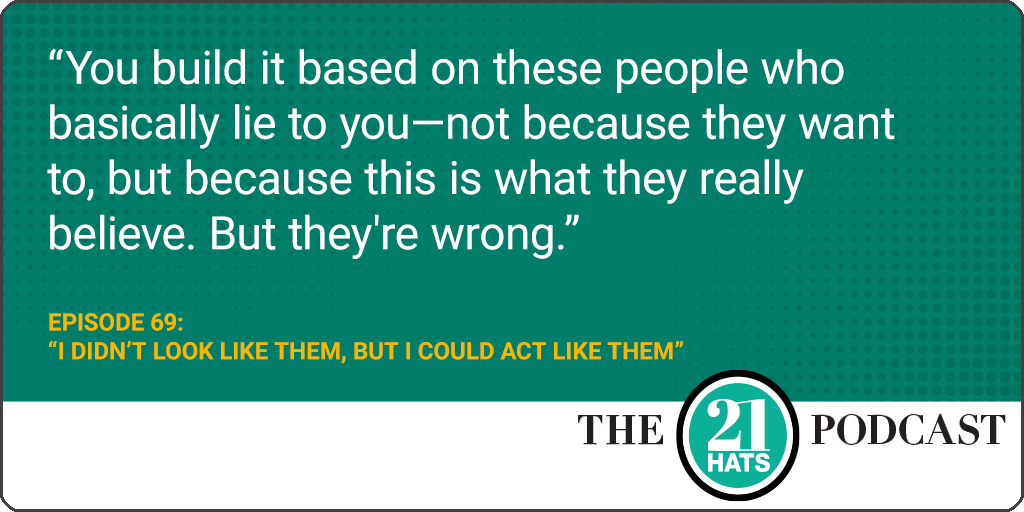Good morning!
Here are today’s highlights:
Desperately seeking employees, employers emulate telemarketers.
A new app wants to be the Spotify of travel.
And in our latest 21 Hats Podcast, getting customers to finance your growth.
MANAGEMENT
It’s easy to get excited thinking about geographic expansion. But for Citibin and 21 Hats contributor Liz Reisch Picarazzi, at least for now, there’s no place like home: “In my last conversation with Carey Smith, he conveyed to me, in no uncertain terms, that any small business worth its salt should have a growth plan. So...I created one, and scheduled another Zoom call to walk him through it. Carey is the founder of Big Ass Fans and sold his business in 2017 for $500 million. Clearly he knows how to scale a business. In the meeting I presented how I selected the cities, the marketing creative for the ‘rat campaign,’ and my ideas for getting local media in each market. Just as I was going to launch into a discussion about how squirrels and raccoons fit into the picture, Carey interrupted and said, ‘Liz, Liz...you’re trying to launch from the runway but haven’t left the driveway yet.’”
“As in our previous conversation, Carey redirected the discussion to readiness and fulfillment. What if the marketing works and people can’t buy because we’re out of inventory? What if we sell a lot in Chicago and have no one to install them? Is our warehouse ready to fulfill?” READ MORE
HUMAN RESOURCES
Desperate for employees, employers are digging deep through their files: “In the topsy-turvy labor market of 2021, recruiters are the new telemarketers and job ads are the new spam. In recent months, as the economy has reopened, millions of U.S. workers have found themselves besieged by unlikely suitors, including companies that spurned them with no reply years ago. For workers, that has meant bemusement—and in some cases, a dose of schadenfreude as well. In Arcadia, Calif., Joseph Guerrero, 23, says he was puzzled to receive a recent call from a manager calling on behalf of a local Cheesecake Factory. ‘I knew I didn’t leave my wallet behind,’ said Mr. Guerrero, a case intake worker at a law firm who helps evaluate prospective clients. He hadn’t dined there in years.”
“The manager said that they had received his application, and wondered when he could come interview for a server role.”
“‘I was like ohhhhh, thank you, but yeah, I found another job,’ says Mr. Guerrero, who had indeed applied to the Cheesecake Factory two years ago, along with a bevy of other restaurants, without hearing back.”
“‘The traditional sort of recruiting was post and pray,’ says Barry Asin, president of Staffing Industry Analysts, which researches contingent workforce trends. But amid the current recruiting crunch, he says, more companies are realizing they are sitting on valuable contact information for applicants who have already expressed interest in working for them.”
“Some companies say the strategy is getting bites. In May, hamburger chain White Castle—which has reduced hours in certain locations because of limited staff—reached out via email and text to 550,000 previous applicants dating back to 2017 about current roles. Among them, 32,000 respondents said they were interested.” READ MORE
STARTUPS
A new app lets locals share their favorite spots: “Bimble, a smartphone app that launched in June, might sound like a dating site, but it’s more akin to Spotify. Holed up in Oxford, England, during the pandemic, Francesca Howland and Julia Mallaby Rossler—a couple of formerly globe-trotting corporate refugees—dreamt up the app for travelers to save, share and recommend favorite watering holes, tiny hotels, independent bookstores and the kinds of finds that can make a trip transporting. The platform’s goal: to share insider knowledge with a community of people who want to experience places the way locals do—the app version of that friend you always ask for recommendations before touching down in Boston or Berlin. Without Bimble, you might not find the petting zoo hidden in the Amsterdam Forest or Lucky Chip, a cheerful burger joint in London’s Netil Market.”
“You can also use the app to create a ‘place list’ for your next destination or as a guide to your own town to share with friends—or far-flung strangers.”
“Users fill out little profiles listing the regions they know best as well as their interests (‘ballroom dancing,’ ‘eating amazing food’) so you can suss out like-minded wanderers whose taste in cocktails and caftans is right up your alley.” READ MORE
PRICING
Temporary or not, inflation is rattling restaurants and other businesses: “Only once in six years had Mark Maguire raised prices at his North Dallas restaurant. Then, some of his employees, no doubt noticing the banners touting $1,000 signing bonuses at other eateries, demanded higher wages. And his suppliers hiked the cost of chicken, beef and cooking oil. Maguire’s costs rose so much so fast that he has had to rewrite his menu prices twice since March. Whether additional increases will follow depends upon a complex interaction of food supplies, labor availability and a shape-shifting virus. ‘It’d be foolish for me to believe we’ve seen the worst of it,’ he said. ‘I don’t want to let my mind think about this becoming a long-term deal.’”
“The restaurant owner sees reason to believe inflation will cool. The cost of a 20-pound box of chicken breasts, which soared in 90 days from $42 to $113, already has eased to $92, he said.”
“He has increased his average hourly wage about 30 percent since March, after a group of workers ‘came to me and said nobody wants to do this job and we need more money,’ he said. ‘We were afraid we were going to start losing people to other restaurants.’”
“Cooks can earn $17 an hour, up from $12.50 before the pandemic. Hostesses who made $12 now pocket $15. Yet Maguire can field only 40 workers, down from a full staff of 55, even as demand tops pre-pandemic levels. During especially busy periods, he’s had to close off up to a quarter of his dining room.” READ MORE
THE ECONOMY
Health care has become the country’s largest source of debt in collection: “Americans owe nearly twice as much medical debt as was previously known, and the amount owed has become increasingly concentrated in states that do not participate in the Affordable Care Act’s Medicaid expansion program. New research published Tuesday in JAMA finds that collection agencies held $140 billion in unpaid medical bills last year. An earlier study, examining debts in 2016, estimated that Americans held $81 billion in medical debt.” READ MORE
PROFILE
Does CrossFit have a future? “The pandemic exposed flaws in the business plan. Societal turmoil exposed flaws in the leadership, and the allegations proved that, when [founder Greg] Glassman needed the benefit of the doubt, it was no longer available. The math didn’t work, and he was forced to sell the company. Speaking publicly for the first time since the allegations were levied, Glassman told me, ‘I ran a gym I would join. Formed an affiliate program that I would participate in, wrote material that, had I seen it twenty years ago, we’d all be a whole lot fitter.’ He added, ‘CrossFit succeeded because I was willing to tell the truth that no one else would tell. The world’s changed and I haven’t.’”
“Last June, in response to the killing of George Floyd, [Glassman] made statements that many people considered racist. Soon afterward, several former employees accused Glassman of sexual harassment.”
“Now [new owner Eric] Roza is in the process of attempting to reassemble the company’s early success. It’s difficult to see why Roza, who has an M.B.A. from Stanford, sees any promise in the brand. The answer comes from CrossFit’s long, checkered history of providing life-changing experiences for hundreds of thousands of people.” READ MORE
THE 21 HATS PODCAST
Episode 69: “I Didn’t Look Like Them, But I Could Act Like Them” This week, we introduce a new regular on the 21 Hats Podcast team. Her name is Diana Lee, and she’s the founder of a digital marketing agency. In a conversation with Jay Goltz and Stephanie Stuckey, Diana explains how she got her business off the ground by helping car dealers target diverse communities within their markets, how she bootstrapped her business by convincing those car dealers to prepay 50-percent upfront, and how her first attempt at building a software platform ended with her spending $1 million on a platform that no one wanted to use.
You can subscribe to The 21 Hats Podcast wherever you get podcasts.
If you see a story that business owners should know about, hit reply and send me the link. If you got something out of this email, you can click the heart symbol, you can click the comment icon below, and you can share it with a friend. Thanks for reading, everyone. — Loren





